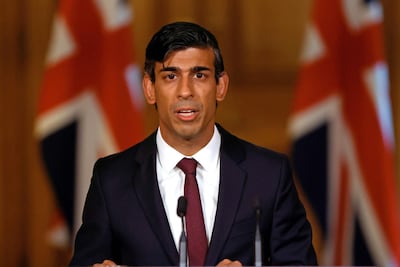The British government borrowed a record £35.9 billion (Dh168.32) in August as the cost of combatting Covid-19 took its toll on the country's public finances, new government data found.
The borrowing figure, which represents the difference between spending and tax income, was £30.5bn more than the government borrowed in August last year making it the highest amount for the month since records began in 1993. In another record, the UK has borrowed £173.7bn since the start of the fiscal year in April, outstripping the £157.7bn set in the 12 months ending March 2010.
“The coronavirus lockdown has meant central government tax receipts and National Insurance contributions in the five months between April and August 2020 were down 13.4 per cent on a year earlier,” the Office for National Statistics said on Friday.
“Over the same period the government’s support for individuals and businesses contributed to an increase of 34.2 per cent in central government’s day-to-day spending compared with a year earlier.”
The deficit could hit £372bn by the end of the tax year, according to the Office for Budget Responsibility, raising borrowing as a share of gross domestic product to 18.9 per cent. This is about seven times the amount borrowed in the financial year ending March 2020 and a level not seen since the Second World War.

On Thursday, chancellor of the exchequer Rishi Sunak set out the government's new support scheme to save millions of jobs and businesses from a winter crisis as escalating Covid-19 cases placed the UK economy under further pressure.
The number of new cases in Britain hit a new record of 6,634 on Thursday, just as the existing job retention scheme, where the government paid up to 80 per cent of a furloughed employee's wages ended. The scheme is among the most expensive stimulus measures with its cost reaching £39.3bn as of September 20.
“The government’s new Job Support Scheme and the extension of the VAT cut for hospitality/tourism announced yesterday may add up to £10bn to the cost of direct support," said Capital Economics in a research note. "The result could be that the chancellor ends up borrowing a whopping £370bn in 2020/21, pushing up the debt to GDP ratio from 88.4 per cent in 2019/20 to 102 per cent in 2020/21. But with the recovery stuttering and no sign of concern in the gilt market, the government is right to have refocused on supporting the economy rather than raising taxes.”
Mr Sunak’s new rescue plan included a series of measures to bolster the economy including plans to subsidise staff wages, extend loans for businesses hit by coronavirus restrictions and offer more support on VAT payments to certain sectors.
Mr Sunak warned he could not save every job or business and urged the country to brace itself for at least six months of hardship.
Economists said the new scheme, where workers must do at least one-third of normal hours, and the government and employer will pay one-third each of the wages for the hours not worked, is much less attractive to employers than the furlough scheme.
"[Employers] will have to pay for more hours than they are receiving from their employees," said Josie Dent, managing economist at the Centre for Economics and Business Research. "Also, there is no support for employees who can’t work. In industries where it is easy to hire new part-time workers or where employers don’t have a strong interest in retaining the skills of their workforce, take-up of the new scheme is likely to be limited, so we are still expecting to see unemployment rise in the months ahead."
The boss of UK clothing chain Next, Lord Wolfson, said on Friday that hundreds of thousands of retail jobs may not survive the crisis, as many positions are now "unviable" as consumers switch to online shopping.
"I wouldn't want to underestimate the difficulty that is going to cause a lot of people in retail," he told the BBC. "I think it's going to be very uncomfortable."
Britain suffered the biggest economic hit in Europe from the coronavirus during the second quarter of this year, with output collapsing by 20.2 per cent compared to 12.1 per cent in the eurozone over the same period.
Britain's economic recovery from the coronavirus crisis is fragile despite signs of a pick-up in activity in recent months, deputy finance minister Stephen Barclay said on Friday.
"After what was a very severe contraction in the economy, we had seen over recent months some recovery, but obviously that recovery is fragile," Mr Barclay said.


